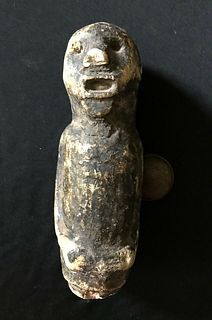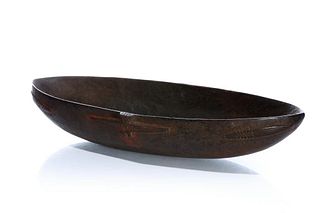SUPERB ITALIAN ETCHED AND GILT ARMOUR BY POMPEO DELLA CESA
Lot 31
Categories
Estimate:
GBP£600,000 - GBP£1,200,000
$810,810.81 - $1,621,621.62
Absentee vs Live bid
Two ways to bid:
- Leave a max absentee bid and the platform will bid on your behalf up to your maximum bid during the live auction.
- Bid live during the auction and your bids will be submitted real-time to the auctioneer.
Bid Increments
| Price | Bid Increment |
|---|---|
| GBP£0 | GBP£10 |
| GBP£100 | GBP£10 |
| GBP£200 | GBP£20 |
| GBP£500 | GBP£50 |
| GBP£1,000 | GBP£100 |
| GBP£2,000 | GBP£200 |
| GBP£5,000 | GBP£500 |
| GBP£10,000 | GBP£1,000 |
| GBP£20,000 | GBP£2,000 |
| GBP£50,000 | GBP£5,000 |
| GBP£100,000 | GBP£10,000 |
| GBP£200,000 | GBP£20,000 |
| GBP£1,000,000 | GBP£50,000 |
About Auction
By Apollo Art Auctions
Jul 13, 2024
Set Reminder
2024-07-13 08:00:00
2024-07-13 08:00:00
America/New_York
Bidsquare
Bidsquare : FINE ANCIENT ART, ANTIQUITIES & MILITARIA - DAY 1
https://www.bidsquare.com/auctions/apollo-art-auctions/fine-ancient-art-antiquities-militaria---day-1-16214
Apollo Art Auctions is delighted to present the "Fine Ancient Art, Antiquities & Militaria" two-day auction on the 13th and 14th of July 2024. Apollo Art Auctions enquiries@apolloauctions.com
Apollo Art Auctions is delighted to present the "Fine Ancient Art, Antiquities & Militaria" two-day auction on the 13th and 14th of July 2024. Apollo Art Auctions enquiries@apolloauctions.com
- Lot Description
Ca. AD 1590 An incredible half-suit of infantry armour, the whole surface of each piece having been lavishly etched and gilt. The central boss on the breastplate depicts an image of the infant Christ in the arms of the Virgin Mary under which is the signature POMP. This signature communicates that this armour was made by the famed Pompeo Della Cesa, one of the leading armourers of the late sixteenth century, arguably the foremost amongst his Italian compatriots, and the master of a large operation based in Milan. His patrons included Philip II of Spain, who also ruled as Duke of Milan; Alessandro Farnese, Duke of Parma; and Emanuele Filiberto, Duke of Savoy. Della Cesa's exceptional work is today showcased in prestigious collections and museums around the globe, such as the Metropolitan Museum of Art, the Wallace Collection, and the Art Institute of Chicago. Further imagery on the breast and back plate includes mythological creatures, musical instruments, war trophies, arabesques, and human figures. The helmet, gorget, pauldrons, rerebraces, couters, vambraces, and tassets have also been etched and gilt. They are decorated with various motifs, including human figures, animals, plants, and religious imagery. To etch and gilt an armour to this magnitude would have been a vastly expensive undertaking, meaning that whoever commissioned this armour must have been a high-ranking member of the social elite. The style of this armour suggests that it was primarily used on foot; indicators include the open-faced helmet, the tassets being a single piece of metal rather than lames, and the lack of ability to attach an arrt or lance rest. The armour retains its original red velvet lining. For similar see: The Wallace Collection, A60.; The Royal Armouries, WYL.I.980. Size: 1020mm x 640mm; Weight: 14.4kg Provenance: Prince Collection; acquired from the Gallerie Fischer in September 2009 from the Schulthess family collection; they acquired it from the Fischer Lucerne Gallery on 30 August 1937. Ex. S. J. Whavell collection, an American collector who acquired the piece in around 1925 from the Metropolitan Museum of Art. The Metropolitan Museum acquired the piece when they purchased en bloc the collection of Charles Maurice Camille de Talleyrand PŽrigord, Duc de Dino in April 1904. The armour was given the accession number 04.3.257 and it appears in the book ÒHandbook of Arms and Armor of the Metropolitan MuseumÓ in plate XXIX on p63. The so-called Dino Collection was catalogued by the Baron de Cosson in 1901; this armour appears as A12 on pp.20-21 in ÒLe cabinet d'armes de Maurice de Talleyrand-Perigord, duc de DinoÓ. De Dino built his collection on the European art market during the last two decades of the nineteenth century. This item has been cleared against the Art Loss Register database and comes with a confirmation letter.
- Shipping Info
-
We offer in-house packing and international shipping at discounted rates.
-
- Buyer's Premium



 EUR
EUR CAD
CAD AUD
AUD GBP
GBP MXN
MXN HKD
HKD CNY
CNY MYR
MYR SEK
SEK SGD
SGD CHF
CHF THB
THB


























